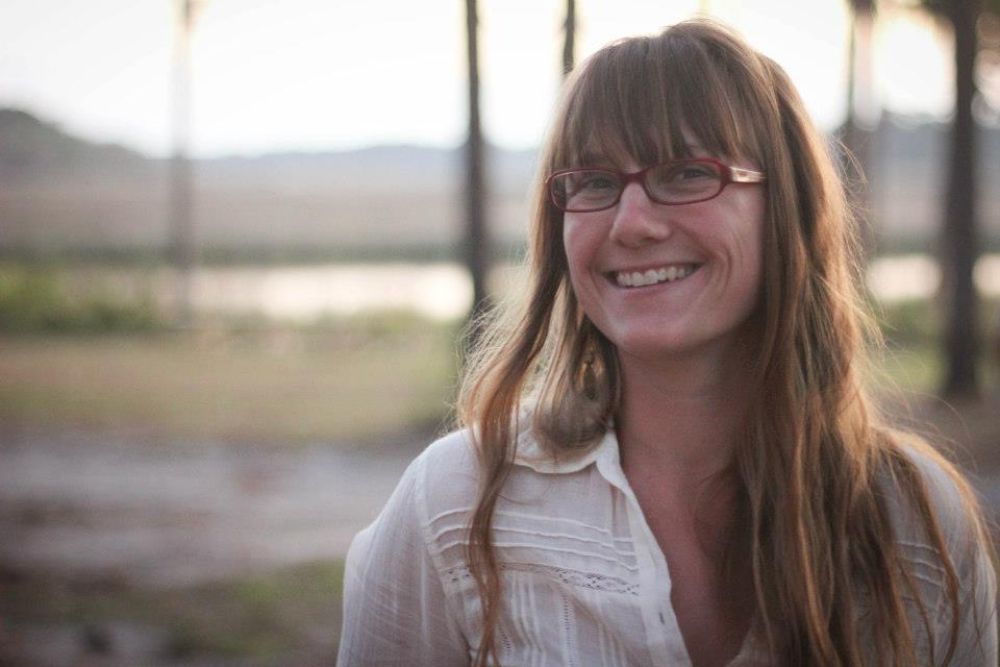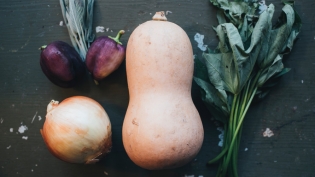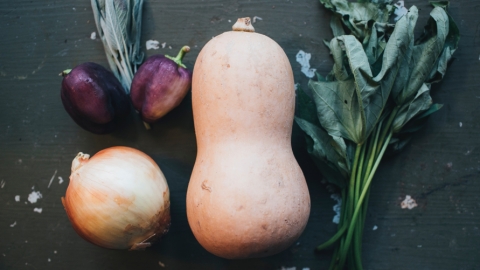Katie Provow on Keeping Up with 300 Hens
Empowered by the hands-on experience of turning a live chicken into the evening meal, Katie and her husband Nick shifted course to start their own poultry business. It's been on-the-job training ever since. While she continues to find satisfaction and joy with this daily connection to the food they produce and eat, life on the farm has its uncertainties - none more challenging than securing a piece of land to call their own.
Ruffled Feathers is unique in the area in that it is focused on raising chickens and turkeys. How did you come to open a poultry farm in this area?
In 2010, we bought our first home in west St Augustine, with a big yard and nice neighbors. We planted a big garden in the front yard, and got a few laying hens. I was working with Communities in Schools of St. Johns County on a grant-funded school garden projects, and participated in the Master Gardener program. My husband Nick, having been laid off from a disenchanting environmental consulting job, was working odd jobs. We weren't sure what we really wanted to do with ourselves. Then our friend Missy raised a few broiler chickens, and invited me to help her harvest the last few. With a repurposed traffic cone and a blood-spattered copy of The Encyclopedia of Country Living, we turned a live chicken, which Missy had raised with care, into the night's meal. It was an empowering experience. Before long Nick and I were raising broiler chickens for ourselves. We began to seek out volunteer and work opportunities on small farms, and we went on to raise a few pigs with Missy in her neighbor's backyard (coincidentally, the yard where Dog Day Gardens is now located!). We don't come from farming, and grew up with pretty typical American diets, but we found joy in this new connection to our food. When the opportunity came to start our own operation raising chickens for KYV Farm's CSA, we jumped in.
What's your background? How did you learn about poultry farming?
I grew up in Charlotte, NC, far from my family's tobacco farming past. I moved to St. Augustine after meeting Nick, and finished my business degree at Flagler College. As I spent my twenties trying to follow a "conventional" career path, I found I felt my best when I was doing something either outside or in my kitchen, and I gobbled up all of the food, gardening and chicken information the internet could offer. The state extension services are such an amazing source of information, as are organizations like the National Young Farmers Coalition and The Greenhorns. I learn a lot from other farmers on Instagram, and from the fantastic Farmer to Farmer podcast. But as with most things, we've learned about poultry farming by just doing it. And by watching and asking questions of other farmers. We've had great teachers in Francisco and Vivian from KYV Farm, and in Dave and Ginger Shields of Pastured Life Farm.
What has your experience been like as part of local farmers markets and running a CSA?
We were extremely lucky for the opportunity to work with KYV Farm when we started, because they had locked down some of the best CSA members in the area with their beautiful and fresh organic produce. These customers were eager to support us from the start, enabling our transition to Non-GMO feeds by committing to, and paying for, 6 months of eggs up front. They also jumped on board with our broiler chicken CSA. The term CSA gets tossed around a lot, but it was key to our training to work with one that was the real deal. Honesty and transparency in farming is difficult to achieve in a market that offers endless selection and availability - having folks willing to commit to us as beginning farmers gave us the confidence to try. Our members have experienced loss with us...that's a unique relationship.
As for farmers' markets, we've had mixed emotions. Our productive capacity has fluctuated in our first three years, and farmers markets can be costly if you don't have a lot of product to sell. Combined with competition from resellers at our chosen markets, it was a frustrating experience. When we got the opportunity to work with Native Sun Natural Foods, it was easy to prioritize deliveries to their stores instead. This is not to say that I don't love and appreciate farmers markets - I've met so many wonderful people, and I'm excited to see more markets, like RAM, focusing on local producers and helping customers navigate the complicated effort to eat clean fresh foods. Markets will be important to our farm's future.
What's the most challenging part of farming small in Northeast Florida?
I think that the challenges to farming small here are the same as they are anywhere. Secure land tenure, weather, access to capital, fatigue...you take a big risk asking a farmer to list their problems! Access to quality chicken feed has probably been our biggest challenge that is somewhat unique to this area. We are committed to using fresh, non-GMO, pesticide-free feeds, and when we started they simply weren't available here. Florida is not a grain producing state in general, and non-GMO chicken feed was unheard of. We had the great fortune of finding Pastured Life Farm, who were working to fill a truck to bring these feeds down from Pennsylvania each month. They now bring down three trucks each month, making our commitment possible and affordable. The quality of the feed we use is directly linked to the quality of the food we produce, and we're happy to pay twice the price of conventional every time we open a feed sack.
We talk a lot about seasonal ingredients and consumers, chefs, restaurants, artisans and farms working together as a "food system." What are some of the hurdles you face in trying to get your product to market?
Without secure land tenure, we chose early on to limit our capital and infrastructure investments to what we can take with us when we move, and that has limited our productive capacity. The regulatory environment is not exactly accommodating to the small poultry farmer...those interested in keeping it that way have deep pockets. So, we've had a lot to learn about how to safely and legally market our products within these constraints. That has meant no marketing to restaurants. If we can get to a property of our own, that will be the next big phase for us. The seasonality of poultry farming is another consideration. Managing a productive flock of 300+ laying hens on pasture takes not only the daily upkeep but a great deal of long term planning to have eggs year-round, season after season. And while we could theoretically raise broiler chickens and turkeys year round, we've chosen to grow those only seasonally. We've had to educate our customers accordingly.
What plans do you have for the future? -- and what are your biggest biggest challenges?
Ruffled Feathers Farm has a very uncertain future at the moment. The land we have leased for the last three years will become unavailable to us in a few short months. We've been working for over a year to find suitable property nearby, with the hope that once we crossed the three year mark, we would be well qualified enough to secure financing. We're working on a deal right now, and the next few weeks will decide our fate. If we can get to our own farm, we're ready to hit the ground running. We'll continue our poultry operations, with a big push next season to get our broiler chickens into restaurants - we're really excited to see what a talented chef could do with our slow-grown "label-rouge" style bird. We also dream of diversifying the farm to include other animals and gardens, though the land will determine what we pursue, and when. If we can't secure financing for this deal, we'll be closing up shop. We'll do so with great sadness, but after searching for other lease arrangements, we've decided that we can only proceed with the long term security that land ownership will afford us. To continue to sacrifice our bodies and spirits, and to go into debt doing it, is not sustainable. We know that there will be other ways to connect to our local food system, and the education we've gotten over the last five years will go a long way in helping us chart a new course.
Finally -- what advice would you give to women who are interested in working on, working with, or owning, a small farm?
Start slow, don't do it alone, and don't expect to take any time off or make any money for at least the first five years. Learn as much as you can on someone else's dime, but expect to put in your share of time and money if you want someone to spend their time and resources teaching you. Know that you will experience loss that you both can and cannot control, but that if you are honest and own up to your failings, you'll learn more and you'll gain your partners' and customers' trust. The challenges facing our food system are huge, and it can feel defeating to work so hard to affect such a tiny bit of change for a tiny number of people. But, our efforts add up, and providing something so elemental as good clean food is more rewarding than I could have ever imagined. Don't hesitate - America needs farmers.







